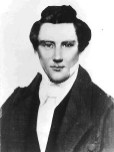|
|
| Line 31: |
Line 31: |
| {{:Question: What do the Hurlbut affidavits say about Joseph Smith claiming that he was "as good as Jesus Christ"?}} | | {{:Question: What do the Hurlbut affidavits say about Joseph Smith claiming that he was "as good as Jesus Christ"?}} |
|
| |
|
| ==Spalding manuscript claims and reliability==
| | {{:Question: What do the Hurlbut affidavits say about the Spalding manuscript and the Book of Mormon?}} |
| Hurlbut's affidavits regarding the Spalding manuscript consist of interviews with family and associates of Solomon Spalding. | |
|
| |
|
| {| valign="top" border="1" style="width:100%; font-size:85%"
| |
| !width="20%"|Claimant
| |
| !width="80%"|Claims
| |
| |-
| |
| |
| |
| ====Artemas Cunningham====
| |
| ||
| |
| *Claimed to have '''"partially examined" the "Mormon Bible."'''
| |
| *Claimed that Spalding's manuscript was called "Manuscript Found."
| |
| *Claimed "to remember the name of '''Nephi'''" as the "principal hero."
| |
| |-
| |
| |
| |
| ====Nahum Howard====
| |
| |
| |
| *Claimed to have "'''lately read the Book of Mormon'''."
| |
| *Claimed that it was the same as Spalding wrote, '''"except the religious part."''''
| |
| |-
| |
| |
| |
| ====Henry Lake====
| |
| ||
| |
| *Claimed to have recently '''"commenced reading [The Book of Mormon] aloud."'''
| |
| *Claimed that Spalding's work frequently used the words "it came to pass."
| |
|
| |
|
| |-
| | </onlyinclude> |
| |
| |
| | |
| ====John Miller====
| |
| ||
| |
| *Claimed to have '''"recently examined the Book of Mormon."'''
| |
| *Claimed that the Book of Mormon was '''"mixed up with scripture and other religious matter, which I did not meet with in the "Manuscript Found."'''
| |
| *Claimed that '''"Nephi, Lehi, Moroni"''' were the "principal names" in Spalding's book.
| |
| |-
| |
| |
| |
| ====Oliver Smith====
| |
| ||
| |
| *Claimed that "'''Nephi and Lehi''' were by [Spalding] represented as leading characters."
| |
| *Claimed that Spalding included '''"no religious matter"''' in his book.
| |
| *Claimed that "I obtained the book [of Mormon], and on reading it, found much of it the same as Spalding had written."
| |
| |-
| |
| |
| |
| ====John Spalding====
| |
| (Brother of Solomon Spalding)
| |
| ||
| |
| *Claimed to have "'''recently read the Book of Mormon'''."
| |
| *Claimed that Spalding's book was entitled ''The Manuscript Found''.
| |
| *Claimed that the book attempted to show that the American Indians are the descendents of the Jews.
| |
| *Claimed that the leaders of the group were called '''"Nephi" and "Lehi."'''
| |
| *Claimed that the book described two nations called the "Nephites" and the "Lamanites."
| |
| *Claimed that the people described in Spalding's book buried their dead in large mounds.
| |
| *Claimed that many sentences in Spalding's book began with "it came to pass."
| |
| |-
| |
| |
| |
| ====Martha Spalding====
| |
| (wife of Solomon Spalding)
| |
| ||
| |
| *Claimed that she had "'''read the Book of Mormon'''."
| |
| *Claimed that the Book of Mormon was based upon Spalding's story.
| |
| *Claimed that "the names of '''Nephi and Lehi''' are yet fresh in my memory, as being the principal heroes of his tale."
| |
| *Claimed that Spalding's characters separated into two nations, "one of which was called Lamanites and the other Nephites."
| |
| *Claimed that Spalding's tale told of the dead "being buried in large heaps was the cause of the numerous mounds in the country."
| |
| *Claimed that Spalding's manuscript used the words "it came to pass."
| |
| |-
| |
| |
| |
| | |
| ====Aaron Wright====
| |
| ||
| |
| *Claimed that the Book of Mormon following the Spalding story, '''"excepting the religious matter."'''
| |
| *Claimed that "the names more especially are the same without any alteration."
| |
| |}
| |
| '''Commentary'''
| |
|
| |
|
| {{main|Book_of_Mormon_and_Spalding_manuscript|l1=Book of Mormon and Spalding manuscript}}
| |
|
| |
| *Most of the Spalding-related affidavits make very similar claims, such as the repeated statements that "Nephi" and "Lehi" figured prominently in Spalding's story and that the person making the claim had "recently" read the ''Book of Mormon'' and recognized it as being similar to Spalding's work. The recovered Spalding manuscript, however, bears no resemblance to any of these claims. For this reason, critics who support the Spalding theory have assumed the existence of a ''second'' Spalding manuscript, despite absolutely no evidence to support this.
| |
| * The Spalding theory requires that Sidney Rigdon secretly meet Joseph Smith before the organization of the Church, and provide him with the Book of Mormon manuscript. John Stafford, oldest son of [[#William Stafford|William Stafford]] was asked about this:
| |
|
| |
| {{JohnStaffordOnRigdon}}
| |
| '''''See also:'''''
| |
| *{{FR-17-2-3}}
| |
|
| |
| </onlyinclude>
| |
| == == | | == == |
| {{Endnotes label}} | | {{Endnotes label}} |


